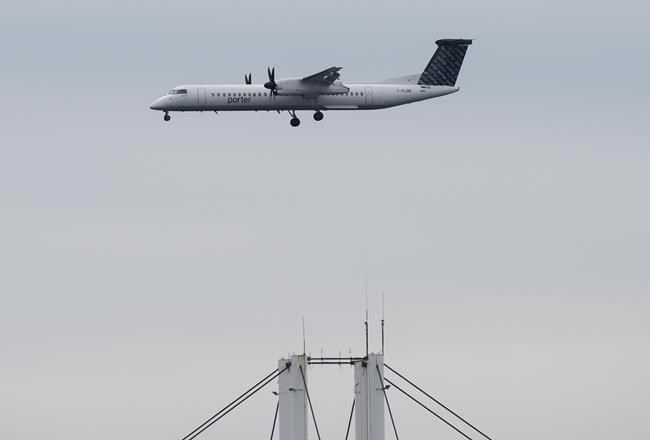
A Porter airplane lands in Toronto on Wednesday, March 18, 2020. Porter Airlines and Air Transat are announcing a joint venture as the two carriers look to expand their range of destinations and tap into each other's markets. THE CANADIAN PRESS/Nathan Denette
Republished November 28, 2023 - 1:13 PM
Original Publication Date November 28, 2023 - 7:21 AM
MONTREAL - Porter Airlines and Air Transat have announced a joint venture, as the two carriers look to expand their range of destinations, tap each other's markets and gear up for a battle with Canada's biggest carrier.
For Toronto-based Porter, the deal will open the gate to Europe and the sunny southern getaways currently being served by Air Transat. Meanwhile, the Montreal-based airline, which largely operates tour package trips, can benefit from access to Porter's rapidly growing network in Canada and the United States.
Announced Tuesday, the "alliance" allows the carriers to co-ordinate pricing and schedules along with revenue sharing, and builds on a year-old code-share agreement, which enables airlines to sell one another’s flights to their own customers. Air Transat said the prior arrangement increased its traveller tally by 60,000 this year.
The deal also comes as competition ramps up on major domestic routes and sun destination flights, even amid uncertain travel demand.
By the end of next year, Flair Airlines aims to increase its fleet to 26 planes from 21, and Lynx Air to 17 aircraft from its current nine. Porter Airlines plans to grow its fleet to 79 by 2025 from 46 currently.
"Porter is in the midst of disrupting the North American market through a significant continental expansion that will only be amplified by this alliance,” CEO Michael Deluce said in a release.
Annick Guérard, chief executive of Transat A.T., which owns Air Transat, said the joint venture will shore up its transatlantic presence "by allowing us to leverage the domestic market served by Porter."
“We will be able to better connect our schedules to facilitate stopovers for passengers,” Guérard added in an interview. "That's not something we could do with the code-share agreement. The price will be more competitive, too.”
Transat in particular could use a boost. As of July 31, its net debt-to-adjusted earnings ratio sat at about 13 times, an exceptionally high figure. Its earnings before interest, taxation, depreciation and amortization were $115 million versus a net debt of $1.5 billion.
Nonetheless, in its third quarter, the 36-year-old company turned a profit for the first time since 2019, netting $57 million.
The joint venture ratchets up pressure on Air Canada, which could feel the pinch on its U.S.-bound routes as well as flights that funnel American passengers through Canadian airports en route to Europe.
"Transat gets a domestic partner to grow transatlantic leisure flights, which compete directly with Air Canada Rouge," noted RBC Dominion Securities analyst Walter Spracklin.
"Overall, we see the joint venture putting further pressure on prices as the competitive landscape intensifies in domestic and transatlantic travel."
Transat expects Porter connecting flights will account for between 15 per cent and 18 per cent of its customers — a feeder system that attracts passengers to Porter as well.
The agreement would also allow Porter's loyalty program members to put their points toward Transat flights.
Ultimately, the commercial agreement seeks to broaden both airlines' reach.
"Carriers need critical mass," said John Gradek, who teaches aviation management at McGill University, adding that smaller players face stronger headwinds.
"This leaves Flair and Lynx to duke it out to see who stays in the Canadian marketplace."
The Porter-Transat challenge to Air Canada could be tough too, due to the carrier's scale and deep pockets.
"I would not be want to be competing in big hubs against the big airlines," said David Neeleman, who co-founded WestJet and JetBlue and currently runs Utah-based Breeze Airways, in an interview.
The joint venture will boost Air Transat's 60 destinations abroad and Porter's 30 in Canada and the United States to a combined 80. Each company will be compensated based on its portion of the journey.
This report by The Canadian Press was first published Nov. 28, 2023.
Companies in this story: (TSX:TRZ)
— With files from Stéphane Rolland
News from © The Canadian Press, 2023